牛津译林版(2019)必修 第一册Unit1 Back to School Grammar and Usage 课件(共54张PPT)
文档属性
| 名称 | 牛津译林版(2019)必修 第一册Unit1 Back to School Grammar and Usage 课件(共54张PPT) |
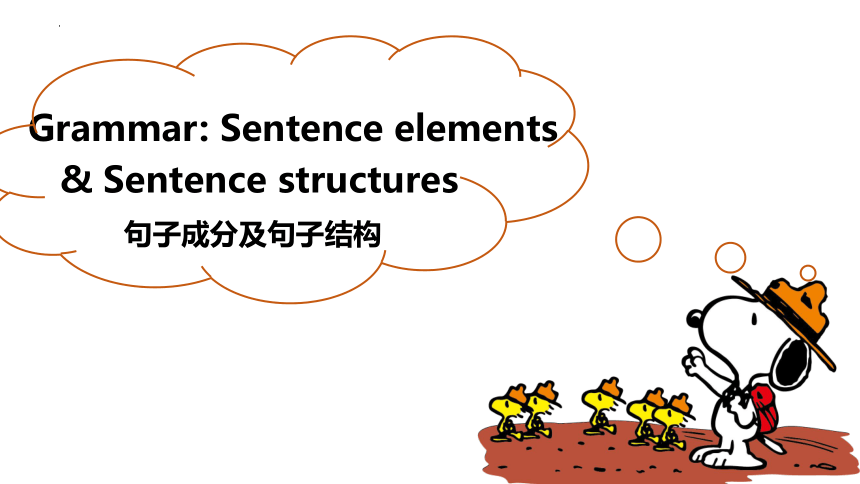
|
|
| 格式 | pptx | ||
| 文件大小 | 4.9MB | ||
| 资源类型 | 教案 | ||
| 版本资源 | 牛津译林版(2019) | ||
| 科目 | 英语 | ||
| 更新时间 | 2024-07-01 00:00:00 | ||
图片预览

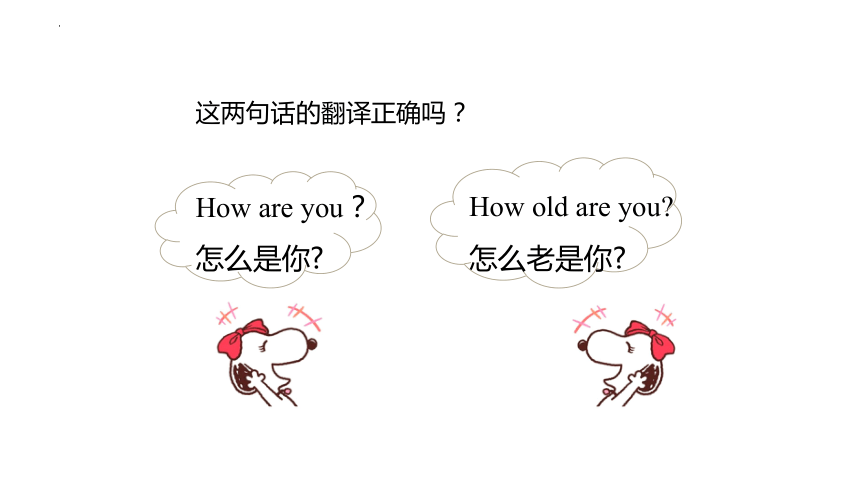
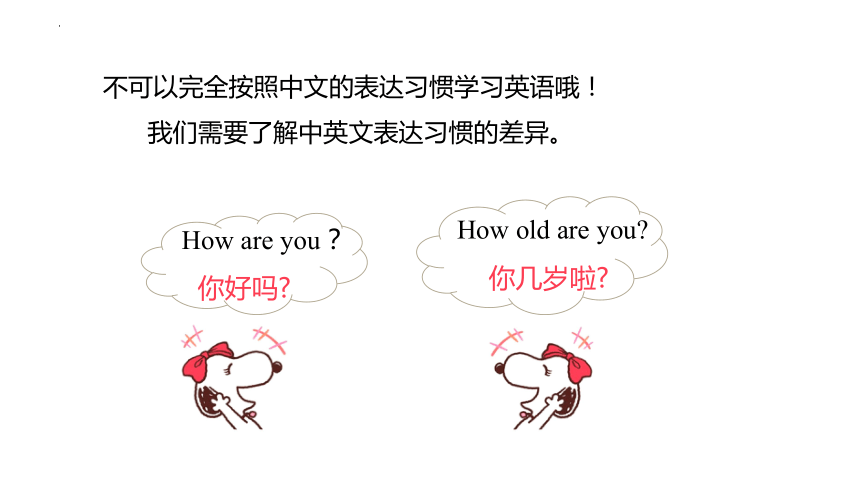
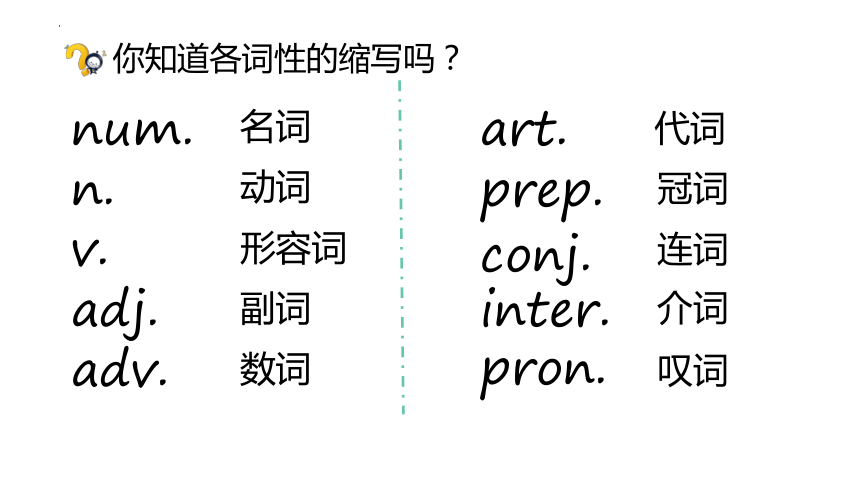
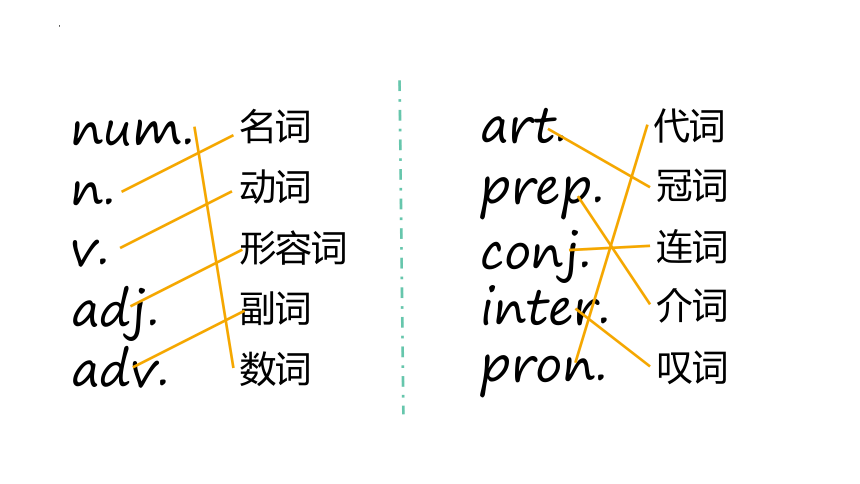

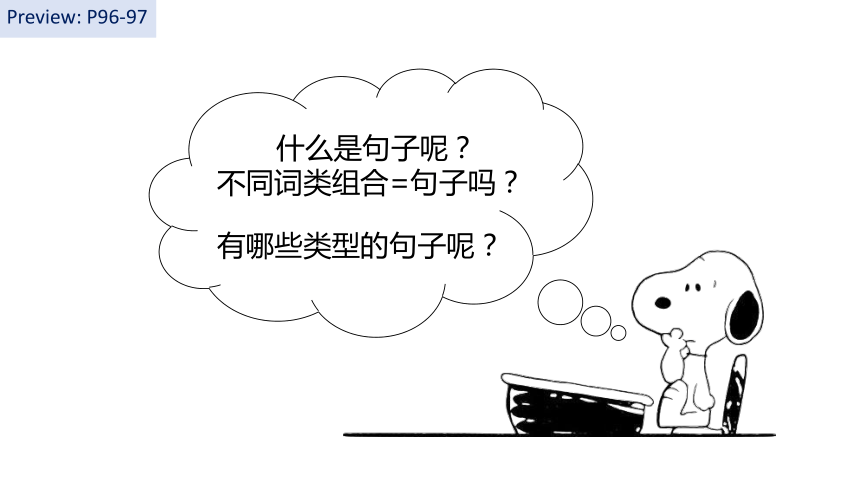
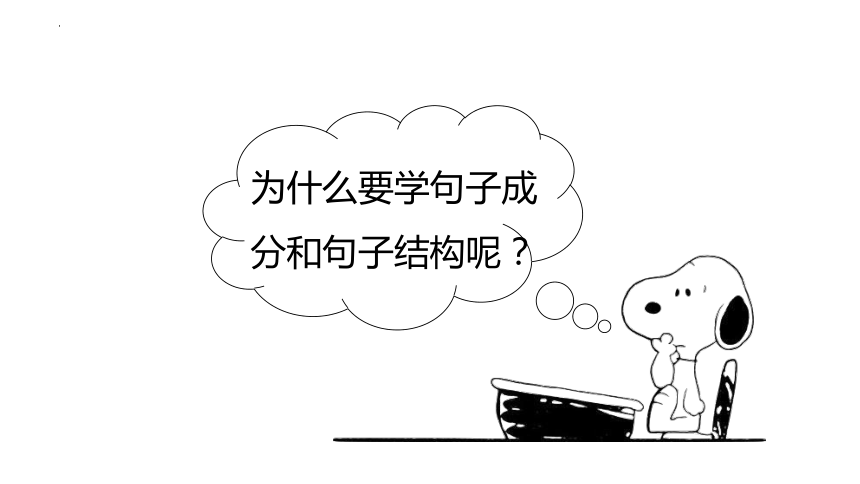
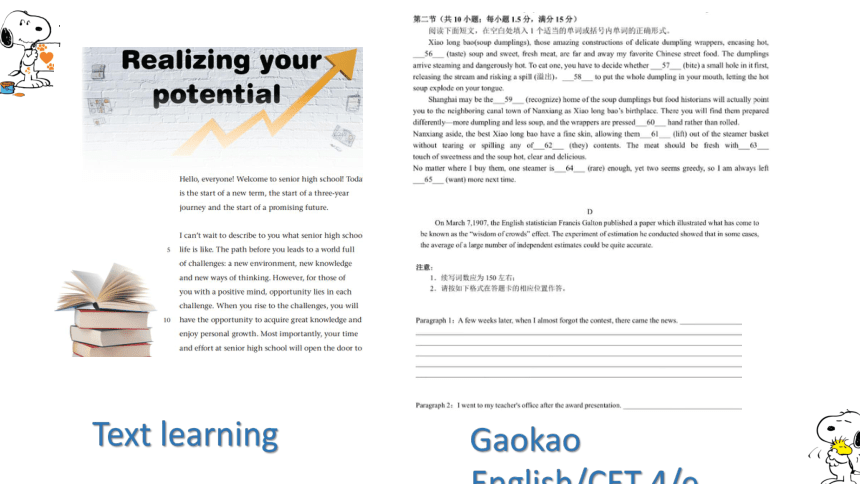
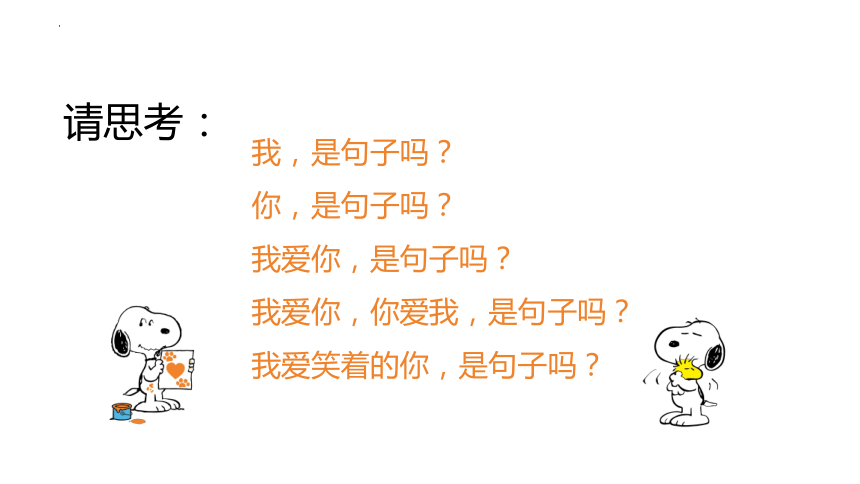
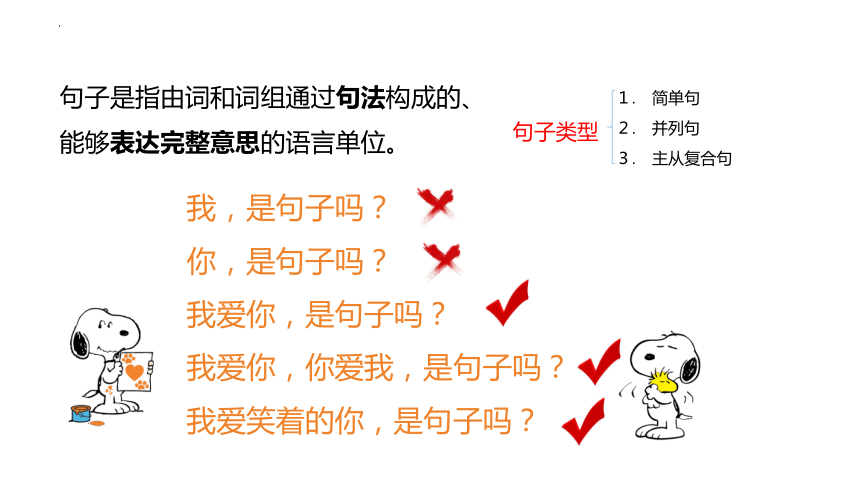
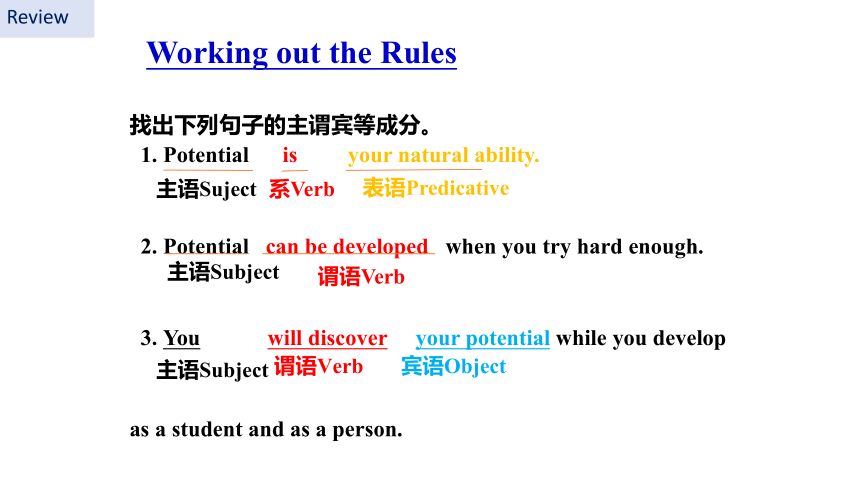
文档简介
(共54张PPT)
Grammar: Sentence elements
& Sentence structures
句子成分及句子结构
这两句话的翻译正确吗?
How are you?
怎么是你
How old are you
怎么老是你
不可以完全按照中文的表达习惯学习英语哦!
我们需要了解中英文表达习惯的差异。
How are you?
你好吗
How old are you
你几岁啦
v.
n.
adj.
adv.
num.
名词
动词
形容词
副词
数词
prep.
art.
conj.
inter.
pron.
代词
冠词
连词
介词
叹词
你知道各词性的缩写吗?
v.
n.
adj.
adv.
num.
名词
动词
形容词
副词
数词
prep.
art.
conj.
inter.
pron.
代词
冠词
连词
介词
叹词
v.
n.
adj.
pron.
prep.
art.
conj.
inter.
adv.
名词
动词
形容词
代词
副词
冠词
连词
介词
叹词
实词 虚词
num.
数词
词类
什么是句子呢?
不同词类组合=句子吗?
有哪些类型的句子呢?
Preview: P96-97
为什么要学句子成分和句子结构呢?
Text learning
Gaokao English/CET 4/e
我,是句子吗?
你,是句子吗?
我爱你,是句子吗?
我爱你,你爱我,是句子吗?
我爱笑着的你,是句子吗?
请思考:
我,是句子吗?
你,是句子吗?
我爱你,是句子吗?
我爱你,你爱我,是句子吗?
我爱笑着的你,是句子吗?
句子是指由词和词组通过句法构成的、
能够表达完整意思的语言单位。
句子类型
1. 简单句
2. 并列句
3. 主从复合句
找出下列句子的主谓宾等成分。
1. Potential is your natural ability.
2. Potential can be developed when you try hard enough.
3. You will discover your potential while you develop
as a student and as a person.
Working out the Rules
主语Suject
系Verb
主语Subject
谓语Verb
Review
表语Predicative
主语Subject
谓语Verb
宾语Object
4. She gave me a pen.
5. You will find yourself growing into a well-rounded individual.
Working out the Rules
主语Subject
谓语Verb
间接宾语indirect Object
直接宾语
indirect Object
主语Subject
谓语Verb
宾语补足语object Complement
宾语Object
What’s the significance of
setting goals
Page 6 A
A Exploring the rules On the first day of school,Miss Yan gave a short speech about the importance of setting goals. Pay attention to the underlined sentences and fill in the table below. The first one has been done for you.
Albert Einstein said,“If you want to live a happy life,tie it to a goal.”(1)I agree. Goals are important in many ways.(2)Setting goals gives you a focus in life. By setting goals now,you are deciding what you want to achieve in the future. Then you know where you are going in life and can work hard to get there. Setting goals also helps you develop good habits. To realize your goals, you need to have a good plan,manage your time well and pay attention to details.(3)These habits will be helpful. Finally,(4)setting goals makes you more confident. When you achieve a goal,you see the result of your hard work and know how much progress you have made. A goal is a dream that needs action. As a result of your action,your dream will come true and hopefully(5)you will live a happy life.
What’s the significance of setting goals
Setting goals gives a focus in life, helps develop good habits and makes one more confident.
Subject Verb
I agree.
Subject Verb Predictive
Subject Verb Object
Subject Verb Indirect object Direct object
Subject Verb Object Object complement
These habits
will be
helpful.
You
will live
a happy life.
Setting goals
gives
you
a focus in life.
Setting goals
makes
you
more confident.
Sentence Elements &Structures
Exploring the rules
主谓宾 SVO
主谓宾宾 SVOO
主谓宾宾语 SVOC
主语+谓语
系动词
不及物动词
及物动词
主系表 SVP
主谓 SV
Sentence Structures 句子结构
组成句子的各个部分叫句子成分。
句子成分包括主语S、谓语V、宾语O、表语P、
定语A、状语A、同位语A、宾补O
概念:
I met my best friend Tom walking at the station yesterday, and he was happy.
我昨天在这个车站遇到了我最好的朋友Tom,他很开心。
Sentence elements 句子成分
若是在句子中,
句子中的主语就相当于主角。
除了我还有谁能当主角?
The man...
小李子......
我们就写一句以小李子(Leo)为主语的话吧。
(我们就演一场以小李子为主角的戏吧。)
主语(subject)
1. 主语是句子陈述的对象。
2.一般在句首。
3. 一般由名词,代词或相当于名词的词或短语充当。
1. We study in No. 7 Middle School.
2.The classroom is very clean.
3.To teach them English is my job.
4.Surfing, diving and swimming are all water sports.
5.Four plus four is eight.
6.What he has said is true.
7.The young should respect the old.
代词
名词
不定式
动名词
数词
主语从句
(the+adj表示一类人)
The man holds...
小李子抱着......
小李子做的这个“抱”的动作就表示谓语。
谓语就是主语发出的动作。
小李子既然要抱,
那抱的是什么呢?
好,配角出场!
The man holds a girl.
小李子抱着一个妹纸。
谓语(verb)
1. 表示主语的动作行为。
2. 必须由动词充当。
3.一般在主语后面。
(1) 简单谓语: 是由动词或动词短语构成的。
We study hard.
He often listens to music.
(2) 复合谓语:由“情态动词或助动词 + 动词原形”构成。
He can speak English.
We have finished the task.
I did see her yesterday.
实义动词:及物动词、非及物动词
系动词:be(状态), 持续类V,表像类V,感官类V,变化性V,证明类V
情态动词:must,can-could,will-would,shall-should,may-might,need
助动词:do, have
(V.)
口诀:妆感正持续变像
这个妹纸,也就是配角,
在句子中,
宾语是主语发出动作的作用对象。
主语:小李子
谓语:抱着
宾语:妹纸
评判一个戏的好坏,
可不止演员演技哦,
还有戏中一系列精妙的细节。
所以,
我们现在要给小李子画一个妆。
一个粗糙的彩排,
就这样出来了。
这就是一个简单句。
宾语 (object)
1. 表示动作的对象(动宾);介词涉及的对象(介宾)
2. 用在及物动词或介词后面。
She is playing the piano.
He often helps me.
We enjoy living in the countryside.
He is interested in painting.
3.宾语种类:
(1)双宾语(间接宾语+直接宾语),例如:Please pass me the book.
(2)复合宾语(宾语+宾补),例如:They elected him their monitor.
They saw an exhibition(展览)yesterday.
The heavy rain prevented me from coming to school on time.
How many dictionaries do you have I have five.
They helped the old with their housework yesterday.
He pretended not to see me.
I enjoy listening to popular music.
I think(that)he is fit for his office.
名词
代词
数词
(the+adj表示一类人)
不定式
动名词短语
宾语从句
The handsome man holds a girl.
帅气的小李子抱着一个妹纸。
人靠衣装,马靠鞍!
化妆,金发,
这些都是修饰限定主角的。
The handsome man, with blonde hair holds a girl.
那个帅气的,有一头金发的小李子抱着一个妹纸。
戏服有了,
我们还要搭一个场景。
在句子中修饰名词性的词,被叫做定语。
定语(attribute) “……的”
用来修饰名词或代词,起类似于形容词的修饰作用。
1.He is a clever boy.
2.His father works in a shoe factory.
3.There are 54 students in our class.
4.Do you know Betty’s sister
5.His spoken English is good.
6.The girl in red is his sister.
7.I want to have something to drink.
8.The girl standing under the tree is his daughter.
9.Do you know the man who's standing there
(形容词)
(物主代词)
(数词)
(名词所有格)
(过去分词)
(介词短语)
(现在分词短语)
(从句)
(不定式)
(名词)
The handsome man, with blonde hair on the ship holds a girl.
那个帅气的,有一头金发的小李子在船上抱着一个妹纸。
一个故事,把时间地点讲清楚,
就可以烘托气氛。
时间,地点,都是表示这部剧的背景,
也就是语法中的状语。
状语是啥呢?
作修饰,说明地点,时间,原因,结果,
条件,方式,方向,程度等。
The handsome man, with blonde hair on the ship holds a girl at dusk.
黄昏,那个帅气的,有一头金发的小李子在船上抱着一个妹纸.
状语 (adverbial)
1. 修饰动词,形容词,副词或整个句子。
2. 表示动作发生的时间,地点,原因,结果,目的,方式,程度,条件,让步,伴随等。
Light travels very quickly.
Wait a minute.
I've done it hundreds of times.
I got home, tired and thirsty.
He has lived in the city for ten years.
He is proud to have passed the national college entrance examination.
They came out of the classroom, talking and laughing.
Mr Black came back drunk that night.
Once you begin, you must continue.
副词
名词
数词
形容词
介词短语
不定式短语
现在分词
过去分词
状语从句
其实,学语法,
把上面搞清楚也差不多够了。
不过呢,
还是会让你们把其余三个了解一下。
这里的alone,
就是宾语Karl的补语,
对宾语Karl的补充说明,
使句子更完整。
She let him alone.
她丢下他一个人。
*补语最常见的就是宾语补足语。
*表语,就是放在主语后面的补足语,用来说明主语的身份,品质,状态的词或从句,常位于系动词之后。
宾语补足语(object complement)
在宾语后面,对宾语进行补充说明,与宾语一起构成复合宾语。
I made my room beautiful.
I can see her dancing there.
He had his car washed.
She asked me to lend her my bike.
Please make yourself at home.
We keep the dog out.
We call her Madam.
形容词
现在分词
过去分词
不定式
介词短语
副词
名词
表语(predicative)
1. 说明主语的身份、类属、状态或特征。
2. 位于系动词后面(最常见的系动词是be)。
1.He is young.
2.I am a teacher.
3.Everybody is here.
4.My job is to teach them English.
5.Now they are at home.
6.The book is what I need.
7.He got lost in the forest.
8.His hobby is swimming.
形容词
名词
副词
不定式短语
介词短语
从句
过去分词
动名词
The other man is a Mr. Perfect.
那个男人是个高富帅。
高富帅,是对the other man
进行补充说明。
主系表,也可以说成主谓补。
Karl,a Mr. Perfect, is cheated by a girl!
卡尔,堂堂一个高富帅,居然被妹纸骗了!
这就说到我们讲的同位语了,
同位语就是两个词语,
都是在说同一个人。
同位语(apposition)
1.对前面的名词或代词做进一步解释,说明它们的性质和情况。
2.在句中和前面的名词指同一人、同一物,同做一种句子成分。
3.同位语去掉后不影响句意,定语去掉后句子意思不明确。
1. Tom, our monitor, is a handsome boy.
2. I myself will do the experiment.
3. She is the oldest among them six.
4. The news that he is ill worries us.
名词
反身代词
数词
从句
句子成分 意义 可充当该成分的词类 在句中的位置
主语 表示句子说的是什么人或什么事 名,代,数,不定式,动名词,短语或句子 句首,在谓语动词前
谓语
宾语
表语
定语
状语
补语
同位语
主谓是基础,宾表定状补辅助。宾主来自名代数,动词作谓不可无!
句子成分 意义 可充当该成分的词类 在句中的位置
主语 表示句子说的是什么人或什么事 名/名短,代,数,the+adj 不定式,动名词 句子 句首,在谓语动词前
谓语 说明主语发出的动作或所处的状态 简单谓语:动词或动词词组 复合谓语:情态V/助V + V原 主语后面
宾语 表示动作行为的对象 同主语...... 双宾语:间宾(人)+直宾(物) 复合宾语:宾语+宾补(adj/doing/done) 及物动词后;
介词后面
表语 表明主语的身份性质或特征 形,名,副,介短 不定式,动名词,过去分词 句子 be/系动词后面
定语 用来修饰名词或代词 形,名,数,名词所有格,介短 不定式,动名词,过去分词 句子 名词前面
状语 修饰动词,形容词,副词或句子表示动作发生的时间,地点,原因,目的,方式,结果等 副,形,名,数,介短 不定式,动名词,过去分词 句子 动词/宾语后面;
整个句子前面
补语 补足主语和宾语的意义 形,名,副,介短 不定式,动名词,过去分词 句子 主语/宾语后面
同位语 表示与前面名词相同的人或事 名,代,数, 句子 主语/宾语后面
主谓宾、定状补,主干枝叶分清楚。
主干成分主谓宾,枝叶成分定状补。
定语就在主宾前,谓前状语谓后补。
状语有时在主前,逗号分开心有数。
句子成分划分口诀
【实战演练】
Ⅰ 指出画线部分所作的句子成分
1.The aged are well taken care of in the village.________
主语
2.He managed to finish the work in time.________
宾语
3.His wish is to become a scientist.________
表语
4.Great changes have taken place in China since 1980.
谓语
5.He noticed a man enter the room._______________
宾语补足语
6.Would you tell me your advice
_____________________________________________
me作间接宾语,your advice作直接宾语
7.I opened the window to let some fresh air in.________
状语
8.I'll never forget the day when I worked together with you. ________
定语
I saw my best friend Tom walking at the station yesterday, and he was busy.
↓
主语
↓
谓
语
↓
定语
↓
宾
语
↓
地
点
状
语
↓
时
间
状
语
↓
主语
↓
谓
语
↓
表语
↓
同位语
↓
宾补
Rule 1: The subject and the ________ are necessary parts of a sentence.
verb
Exploring the rules
I agree.
You will live a happy life.
Subject
Subject
Intranstive verb (vi.)
Transtive verb (vt.)
Object
object
nouns
pronouns
Rule 2: A transitive verb is always followed by a(n) _________. Objects are usually _______ or ____________.
S + V + O
Setting goals gives you a focus in life.
Setting goals gives a focus to you in life.
Rule 3: Some verbs can have two objects. The indirect object usually refers to a person and the direct object a thing.
S + V + dO + iO
Setting goals makes you more confident.
Object complement (OC)
S + V + O + oC
Rule 4: The object complement adds more information about the object.
Ⅰ 选出下列句子属于哪种句子结构
①SV ②SVO ③SVP ④SVOO ⑤SVOC ⑥SVA ⑦SVOA
1. Time flies.______
①
2. He enjoys reading.______
②
3. The sun keeps us warm.______
⑤
4. The dinner smells good.______
③
5. The red sun rises in the east.______
⑥
【实战演练】
7. This is an English-Chinese dictionary.______
③
8. I want to have a cup of tea very much.______
⑦
9. Would you please pass me the dictionary ______
④
10. She cooked her husband a delicious meal. ______
④
6. Balancing my study and hobbies remains a challenge.______
③
语法
词类
句子
1. 句子类型
2. 句子成分:
3. 句子结构
1. 实词:
2. 虚词:
1. 简单句
2. 并列句
3. 复杂句
名形动副(加)数代
介冠(加上连)连叹
Summary
主谓宾表,定状补同
1. 主谓 SV
2. 主谓宾 SVO
3. 主谓宾宾 SVOO
4. 主谓宾宾补 SVOC
5. 主系表 SVP
Homework
1. Preview: Page 7-B1 B2
2. Exercise: Page58-Part C
Thank you!
Applying the Rules
B1
Applying the Rules
1. You will find (senior high) school different from (junior high) school.
2. (Your) schoolwork will be more challenging.
3. We will give you (more) independence.
4. You should listen [more carefully].
5. You can join a club.
6. (Your) teachers will help you [in (many) ways].
7. You will succeed.
B2
c
b
d
g
e
a
f
Applying the Rules
I saw two best friends at the station yesterday, and he was happy.
↓
代词
↓
动
词
↓
形容词
↓
名
词
↓
名
词
↓
副
词
↓代词
↓
动
词
↓
形容词
↓
连词
↓
冠
词
↓
介
词
↓
数词
Review
Grammar: Sentence elements
& Sentence structures
句子成分及句子结构
这两句话的翻译正确吗?
How are you?
怎么是你
How old are you
怎么老是你
不可以完全按照中文的表达习惯学习英语哦!
我们需要了解中英文表达习惯的差异。
How are you?
你好吗
How old are you
你几岁啦
v.
n.
adj.
adv.
num.
名词
动词
形容词
副词
数词
prep.
art.
conj.
inter.
pron.
代词
冠词
连词
介词
叹词
你知道各词性的缩写吗?
v.
n.
adj.
adv.
num.
名词
动词
形容词
副词
数词
prep.
art.
conj.
inter.
pron.
代词
冠词
连词
介词
叹词
v.
n.
adj.
pron.
prep.
art.
conj.
inter.
adv.
名词
动词
形容词
代词
副词
冠词
连词
介词
叹词
实词 虚词
num.
数词
词类
什么是句子呢?
不同词类组合=句子吗?
有哪些类型的句子呢?
Preview: P96-97
为什么要学句子成分和句子结构呢?
Text learning
Gaokao English/CET 4/e
我,是句子吗?
你,是句子吗?
我爱你,是句子吗?
我爱你,你爱我,是句子吗?
我爱笑着的你,是句子吗?
请思考:
我,是句子吗?
你,是句子吗?
我爱你,是句子吗?
我爱你,你爱我,是句子吗?
我爱笑着的你,是句子吗?
句子是指由词和词组通过句法构成的、
能够表达完整意思的语言单位。
句子类型
1. 简单句
2. 并列句
3. 主从复合句
找出下列句子的主谓宾等成分。
1. Potential is your natural ability.
2. Potential can be developed when you try hard enough.
3. You will discover your potential while you develop
as a student and as a person.
Working out the Rules
主语Suject
系Verb
主语Subject
谓语Verb
Review
表语Predicative
主语Subject
谓语Verb
宾语Object
4. She gave me a pen.
5. You will find yourself growing into a well-rounded individual.
Working out the Rules
主语Subject
谓语Verb
间接宾语indirect Object
直接宾语
indirect Object
主语Subject
谓语Verb
宾语补足语object Complement
宾语Object
What’s the significance of
setting goals
Page 6 A
A Exploring the rules On the first day of school,Miss Yan gave a short speech about the importance of setting goals. Pay attention to the underlined sentences and fill in the table below. The first one has been done for you.
Albert Einstein said,“If you want to live a happy life,tie it to a goal.”(1)I agree. Goals are important in many ways.(2)Setting goals gives you a focus in life. By setting goals now,you are deciding what you want to achieve in the future. Then you know where you are going in life and can work hard to get there. Setting goals also helps you develop good habits. To realize your goals, you need to have a good plan,manage your time well and pay attention to details.(3)These habits will be helpful. Finally,(4)setting goals makes you more confident. When you achieve a goal,you see the result of your hard work and know how much progress you have made. A goal is a dream that needs action. As a result of your action,your dream will come true and hopefully(5)you will live a happy life.
What’s the significance of setting goals
Setting goals gives a focus in life, helps develop good habits and makes one more confident.
Subject Verb
I agree.
Subject Verb Predictive
Subject Verb Object
Subject Verb Indirect object Direct object
Subject Verb Object Object complement
These habits
will be
helpful.
You
will live
a happy life.
Setting goals
gives
you
a focus in life.
Setting goals
makes
you
more confident.
Sentence Elements &Structures
Exploring the rules
主谓宾 SVO
主谓宾宾 SVOO
主谓宾宾语 SVOC
主语+谓语
系动词
不及物动词
及物动词
主系表 SVP
主谓 SV
Sentence Structures 句子结构
组成句子的各个部分叫句子成分。
句子成分包括主语S、谓语V、宾语O、表语P、
定语A、状语A、同位语A、宾补O
概念:
I met my best friend Tom walking at the station yesterday, and he was happy.
我昨天在这个车站遇到了我最好的朋友Tom,他很开心。
Sentence elements 句子成分
若是在句子中,
句子中的主语就相当于主角。
除了我还有谁能当主角?
The man...
小李子......
我们就写一句以小李子(Leo)为主语的话吧。
(我们就演一场以小李子为主角的戏吧。)
主语(subject)
1. 主语是句子陈述的对象。
2.一般在句首。
3. 一般由名词,代词或相当于名词的词或短语充当。
1. We study in No. 7 Middle School.
2.The classroom is very clean.
3.To teach them English is my job.
4.Surfing, diving and swimming are all water sports.
5.Four plus four is eight.
6.What he has said is true.
7.The young should respect the old.
代词
名词
不定式
动名词
数词
主语从句
(the+adj表示一类人)
The man holds...
小李子抱着......
小李子做的这个“抱”的动作就表示谓语。
谓语就是主语发出的动作。
小李子既然要抱,
那抱的是什么呢?
好,配角出场!
The man holds a girl.
小李子抱着一个妹纸。
谓语(verb)
1. 表示主语的动作行为。
2. 必须由动词充当。
3.一般在主语后面。
(1) 简单谓语: 是由动词或动词短语构成的。
We study hard.
He often listens to music.
(2) 复合谓语:由“情态动词或助动词 + 动词原形”构成。
He can speak English.
We have finished the task.
I did see her yesterday.
实义动词:及物动词、非及物动词
系动词:be(状态), 持续类V,表像类V,感官类V,变化性V,证明类V
情态动词:must,can-could,will-would,shall-should,may-might,need
助动词:do, have
(V.)
口诀:妆感正持续变像
这个妹纸,也就是配角,
在句子中,
宾语是主语发出动作的作用对象。
主语:小李子
谓语:抱着
宾语:妹纸
评判一个戏的好坏,
可不止演员演技哦,
还有戏中一系列精妙的细节。
所以,
我们现在要给小李子画一个妆。
一个粗糙的彩排,
就这样出来了。
这就是一个简单句。
宾语 (object)
1. 表示动作的对象(动宾);介词涉及的对象(介宾)
2. 用在及物动词或介词后面。
She is playing the piano.
He often helps me.
We enjoy living in the countryside.
He is interested in painting.
3.宾语种类:
(1)双宾语(间接宾语+直接宾语),例如:Please pass me the book.
(2)复合宾语(宾语+宾补),例如:They elected him their monitor.
They saw an exhibition(展览)yesterday.
The heavy rain prevented me from coming to school on time.
How many dictionaries do you have I have five.
They helped the old with their housework yesterday.
He pretended not to see me.
I enjoy listening to popular music.
I think(that)he is fit for his office.
名词
代词
数词
(the+adj表示一类人)
不定式
动名词短语
宾语从句
The handsome man holds a girl.
帅气的小李子抱着一个妹纸。
人靠衣装,马靠鞍!
化妆,金发,
这些都是修饰限定主角的。
The handsome man, with blonde hair holds a girl.
那个帅气的,有一头金发的小李子抱着一个妹纸。
戏服有了,
我们还要搭一个场景。
在句子中修饰名词性的词,被叫做定语。
定语(attribute) “……的”
用来修饰名词或代词,起类似于形容词的修饰作用。
1.He is a clever boy.
2.His father works in a shoe factory.
3.There are 54 students in our class.
4.Do you know Betty’s sister
5.His spoken English is good.
6.The girl in red is his sister.
7.I want to have something to drink.
8.The girl standing under the tree is his daughter.
9.Do you know the man who's standing there
(形容词)
(物主代词)
(数词)
(名词所有格)
(过去分词)
(介词短语)
(现在分词短语)
(从句)
(不定式)
(名词)
The handsome man, with blonde hair on the ship holds a girl.
那个帅气的,有一头金发的小李子在船上抱着一个妹纸。
一个故事,把时间地点讲清楚,
就可以烘托气氛。
时间,地点,都是表示这部剧的背景,
也就是语法中的状语。
状语是啥呢?
作修饰,说明地点,时间,原因,结果,
条件,方式,方向,程度等。
The handsome man, with blonde hair on the ship holds a girl at dusk.
黄昏,那个帅气的,有一头金发的小李子在船上抱着一个妹纸.
状语 (adverbial)
1. 修饰动词,形容词,副词或整个句子。
2. 表示动作发生的时间,地点,原因,结果,目的,方式,程度,条件,让步,伴随等。
Light travels very quickly.
Wait a minute.
I've done it hundreds of times.
I got home, tired and thirsty.
He has lived in the city for ten years.
He is proud to have passed the national college entrance examination.
They came out of the classroom, talking and laughing.
Mr Black came back drunk that night.
Once you begin, you must continue.
副词
名词
数词
形容词
介词短语
不定式短语
现在分词
过去分词
状语从句
其实,学语法,
把上面搞清楚也差不多够了。
不过呢,
还是会让你们把其余三个了解一下。
这里的alone,
就是宾语Karl的补语,
对宾语Karl的补充说明,
使句子更完整。
She let him alone.
她丢下他一个人。
*补语最常见的就是宾语补足语。
*表语,就是放在主语后面的补足语,用来说明主语的身份,品质,状态的词或从句,常位于系动词之后。
宾语补足语(object complement)
在宾语后面,对宾语进行补充说明,与宾语一起构成复合宾语。
I made my room beautiful.
I can see her dancing there.
He had his car washed.
She asked me to lend her my bike.
Please make yourself at home.
We keep the dog out.
We call her Madam.
形容词
现在分词
过去分词
不定式
介词短语
副词
名词
表语(predicative)
1. 说明主语的身份、类属、状态或特征。
2. 位于系动词后面(最常见的系动词是be)。
1.He is young.
2.I am a teacher.
3.Everybody is here.
4.My job is to teach them English.
5.Now they are at home.
6.The book is what I need.
7.He got lost in the forest.
8.His hobby is swimming.
形容词
名词
副词
不定式短语
介词短语
从句
过去分词
动名词
The other man is a Mr. Perfect.
那个男人是个高富帅。
高富帅,是对the other man
进行补充说明。
主系表,也可以说成主谓补。
Karl,a Mr. Perfect, is cheated by a girl!
卡尔,堂堂一个高富帅,居然被妹纸骗了!
这就说到我们讲的同位语了,
同位语就是两个词语,
都是在说同一个人。
同位语(apposition)
1.对前面的名词或代词做进一步解释,说明它们的性质和情况。
2.在句中和前面的名词指同一人、同一物,同做一种句子成分。
3.同位语去掉后不影响句意,定语去掉后句子意思不明确。
1. Tom, our monitor, is a handsome boy.
2. I myself will do the experiment.
3. She is the oldest among them six.
4. The news that he is ill worries us.
名词
反身代词
数词
从句
句子成分 意义 可充当该成分的词类 在句中的位置
主语 表示句子说的是什么人或什么事 名,代,数,不定式,动名词,短语或句子 句首,在谓语动词前
谓语
宾语
表语
定语
状语
补语
同位语
主谓是基础,宾表定状补辅助。宾主来自名代数,动词作谓不可无!
句子成分 意义 可充当该成分的词类 在句中的位置
主语 表示句子说的是什么人或什么事 名/名短,代,数,the+adj 不定式,动名词 句子 句首,在谓语动词前
谓语 说明主语发出的动作或所处的状态 简单谓语:动词或动词词组 复合谓语:情态V/助V + V原 主语后面
宾语 表示动作行为的对象 同主语...... 双宾语:间宾(人)+直宾(物) 复合宾语:宾语+宾补(adj/doing/done) 及物动词后;
介词后面
表语 表明主语的身份性质或特征 形,名,副,介短 不定式,动名词,过去分词 句子 be/系动词后面
定语 用来修饰名词或代词 形,名,数,名词所有格,介短 不定式,动名词,过去分词 句子 名词前面
状语 修饰动词,形容词,副词或句子表示动作发生的时间,地点,原因,目的,方式,结果等 副,形,名,数,介短 不定式,动名词,过去分词 句子 动词/宾语后面;
整个句子前面
补语 补足主语和宾语的意义 形,名,副,介短 不定式,动名词,过去分词 句子 主语/宾语后面
同位语 表示与前面名词相同的人或事 名,代,数, 句子 主语/宾语后面
主谓宾、定状补,主干枝叶分清楚。
主干成分主谓宾,枝叶成分定状补。
定语就在主宾前,谓前状语谓后补。
状语有时在主前,逗号分开心有数。
句子成分划分口诀
【实战演练】
Ⅰ 指出画线部分所作的句子成分
1.The aged are well taken care of in the village.________
主语
2.He managed to finish the work in time.________
宾语
3.His wish is to become a scientist.________
表语
4.Great changes have taken place in China since 1980.
谓语
5.He noticed a man enter the room._______________
宾语补足语
6.Would you tell me your advice
_____________________________________________
me作间接宾语,your advice作直接宾语
7.I opened the window to let some fresh air in.________
状语
8.I'll never forget the day when I worked together with you. ________
定语
I saw my best friend Tom walking at the station yesterday, and he was busy.
↓
主语
↓
谓
语
↓
定语
↓
宾
语
↓
地
点
状
语
↓
时
间
状
语
↓
主语
↓
谓
语
↓
表语
↓
同位语
↓
宾补
Rule 1: The subject and the ________ are necessary parts of a sentence.
verb
Exploring the rules
I agree.
You will live a happy life.
Subject
Subject
Intranstive verb (vi.)
Transtive verb (vt.)
Object
object
nouns
pronouns
Rule 2: A transitive verb is always followed by a(n) _________. Objects are usually _______ or ____________.
S + V + O
Setting goals gives you a focus in life.
Setting goals gives a focus to you in life.
Rule 3: Some verbs can have two objects. The indirect object usually refers to a person and the direct object a thing.
S + V + dO + iO
Setting goals makes you more confident.
Object complement (OC)
S + V + O + oC
Rule 4: The object complement adds more information about the object.
Ⅰ 选出下列句子属于哪种句子结构
①SV ②SVO ③SVP ④SVOO ⑤SVOC ⑥SVA ⑦SVOA
1. Time flies.______
①
2. He enjoys reading.______
②
3. The sun keeps us warm.______
⑤
4. The dinner smells good.______
③
5. The red sun rises in the east.______
⑥
【实战演练】
7. This is an English-Chinese dictionary.______
③
8. I want to have a cup of tea very much.______
⑦
9. Would you please pass me the dictionary ______
④
10. She cooked her husband a delicious meal. ______
④
6. Balancing my study and hobbies remains a challenge.______
③
语法
词类
句子
1. 句子类型
2. 句子成分:
3. 句子结构
1. 实词:
2. 虚词:
1. 简单句
2. 并列句
3. 复杂句
名形动副(加)数代
介冠(加上连)连叹
Summary
主谓宾表,定状补同
1. 主谓 SV
2. 主谓宾 SVO
3. 主谓宾宾 SVOO
4. 主谓宾宾补 SVOC
5. 主系表 SVP
Homework
1. Preview: Page 7-B1 B2
2. Exercise: Page58-Part C
Thank you!
Applying the Rules
B1
Applying the Rules
1. You will find (senior high) school different from (junior high) school.
2. (Your) schoolwork will be more challenging.
3. We will give you (more) independence.
4. You should listen [more carefully].
5. You can join a club.
6. (Your) teachers will help you [in (many) ways].
7. You will succeed.
B2
c
b
d
g
e
a
f
Applying the Rules
I saw two best friends at the station yesterday, and he was happy.
↓
代词
↓
动
词
↓
形容词
↓
名
词
↓
名
词
↓
副
词
↓代词
↓
动
词
↓
形容词
↓
连词
↓
冠
词
↓
介
词
↓
数词
Review
